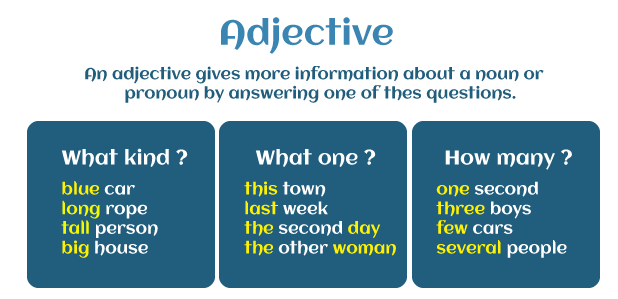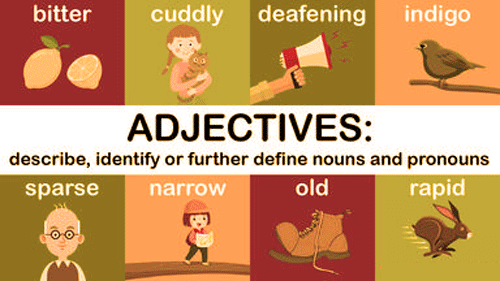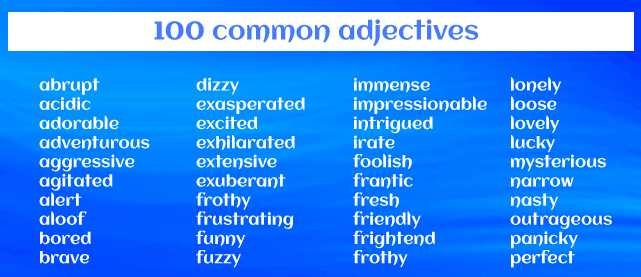Adjective WordsOne of the nine parts of speech is an adjective. Before we get into the details, let us understand what is Adjective? An adjective is a word that defines or describes a noun in greater detail. It's used to "describe" or "modify" a noun. 
An adjective is frequently used BEFORE a noun:
And an adjective can appear Pre or Post a verb:
However, adjectives can also be used to change pronouns (She is beautiful). Consider the following examples:
While these adjective lists are enormous, they only scrape the surface of the English language's descriptive powers. Before diving into the enormous Adjective Words List, let us understand why one should use Adjectives? Why Would You Use an Adjective List?Utilizing an adjective words/ list one can help you enhance your language abilities and streamline your study, regardless you are a native English speaker or studying English as another language.
Adjective WordsAn adjective is utilized to describe a noun or a pronoun in greater detail. It is used for recognizing/ describing a specific individual or a thing. Adjectives include articles such as a, an, and the. We have compiled a list of straightforward and easy-to-understand adjective word examples for you. We have divided the adjectives into lists for your convenience based on their capacity to express touch, colour, shape, and emotion. Adjective Words To Describe TasteThis adjective list will allow you to describe the wonderful tastes. These are just a few of the adjective words that describe the taste. Adjective Words To Describe TasteThis adjective list will allow you to describe the wonderful tastes. These are just a few of the adjective words that describe the taste.
Adjective To Describe TouchWhen it comes to touching anything, there are various terms that can be utilised to describe it. See the adjective words that can help you navigate this world.
Adjective To Describe SoundThe volume of sounds varies. Something could be whispered, booming, or everything in between. Let's have a look at some adjective words that define the sound.
Adjectives Used to Describe ColourThe world is a spectrum of colours. But you'd never be able to describe things if you didn't have adjectives. Examine a few descriptive colour adjectives that you might often use to adorn your reality. Let's take a look at some adjective words that define colour.
Adjectives Used to Describe The SizeWas that spider massive or large? It really doesn't matter because you may use any adjectives you choose to best describe it. Let us have a look at a few adjective words that describe the size of things/objects etc.
Adjectives To Describe ShapeAdjectives for forms can be useful. A blob or a warped toy can be found on your table. Let us have a look at few adjective words that describe the shape of things/objects etc.
Adjectives That Define TimeHow do you express the passage of time or gazing back in time? Adjectives can be used to describe the time period in a variety of ways. Let us have a look at few adjective words that describe timings/ time.

Adjectives Used to Define an AmountWhether it's a large or small number, adjectives are required to describe it. Use these amusing and descriptive adjectives to liven up your writing. Let us have a look at few adjective words that describe the amount.
Adjectives Used to Describe EmotionsPeople's emotions are diverse. There are numerous terms that express how a person feels, ranging from aggressive to cranky to lazy. Though the list of adjectives is extensive, let us look at a few adjective words that best describe the feeling and emotions.
Adjectives Used to Define an Individual or a PersonalityEveryone has a popular friend or a rowdy family member. Consider how you would describe persons around you in the absence of adjectives. Fortunately, you don't have to. Check out this list of descriptive/ adjective words for people or personalities to make life easier.
Adjectives Used to Define AppearanceA story or letter would be meaningless if you couldn't construct a linguistic picture of your characters with adjectives like quirky and uninteresting. Read on and explore adjective words that define a person's physical appearance.
Adjectives Used to Define SituationsAdd some descriptive adjectives to your situational conversation. These words make a the scene or situation so much more interesting. Read on to explore the list of adjective words to describe the situation.
Adjectives Used To Describe ExperienceEveryone expects to have a lot of fantastic experiences throughout their lives. It can be both good and bad at times. We are at a loss for words to describe our experiences most of the time. Continue reading to learn about the adjective words used to describe the experiences.
Adjectives Used to Describe ConditionThese refer to the adjective words that are determined by and dependent on a particular condition. These imply a certain condition at a specific time.
Adjectives Used to Describe Positive Personality/ PersonThere are two kinds of personality adjectives- Positive and Negative. Positive personality adjectives are words that describe the positive traits or good qualities of a person. These generally express the positive aspect of the person and people should try and adopt these traits.
Adjectives Used to Describe A Negative Personality/ PersonThere are two kinds of personality adjectives- Positive and Negative. Negative personality adjectives are words that describe the negative traits or bad qualities of a person. These generally express the negative aspect of the person. Also these traits should be avoided by the person.
Adjectives Used to Describe A Place/LocationFiction authors' jobs are to take their readers to fascinating locations and times. As a result, adjectives are used to provide life to their writing. The adjective words that express a place/location help the reader grasp the writer's point of view and picturise that place/location. Something that is lively and energetic is not the same as something that is dismal and deserted; that is the power of adjective words.
Note: This is not a comprehensive list of adjectives, there are thousands of adjectives, and it is impossible to list all adjective words. These have been broadly categorised and are just a few of the extensive list of adjectives.Adjectives: How to Use ThemAdjectives are used to alter nouns within statements. Adjectives are useful within sentences because they convey more information to the reader. So, they might remind you what something resembles like ("wonderful hat") or how many flowers there are ("ten flowers"). Adjectives are also found with the noun they are changing. Check out a few examples of adjective words in the sentences to better grasp how they are employed in phrases.
Adjectives can also be used to supplement a linking verb, which is known as a predicate adjective. As a result, the adjective may reveal more about how someone is feeling.

Adjective Words in SentenceNow let us use some of the above-mentioned adjective words to form sentences. This will help you better understand the usage of adjectives. Adjective words have been used in the below mentioned sentences. They have been highlighted for your ease of recognition.
Use Adjectives MindfullyNow that we have seen a wonderful list of adjectives, there's one more thing to mention. "Adjectives should be used with caution. It would be best if you never overused them." Nouns and verbs should accomplish the majority of the descriptive work in your writing. Don't just tell your reader something is lovely, fascinating, or interesting. Set a realistic scene with your words, and try employing a sprinkling of adjectives instead of a heavy dousing. Since adjectives are used to infuse emotions, reality, and life in the writings, their appropriate use is essential. Appropriate use can bring a lot of change in how readers absorb the information. Consider adding these positive/negative adjectives to your adjectival repertoire as you strive to create that balance. Having a wide range of possibilities or options at your convenience will help you to select the appropriate adjective at the appropriate time. So, use the adjectives mindfully.
Next TopicTypes of Adjectives
|
 For Videos Join Our Youtube Channel: Join Now
For Videos Join Our Youtube Channel: Join Now
Feedback
- Send your Feedback to [email protected]
Help Others, Please Share









